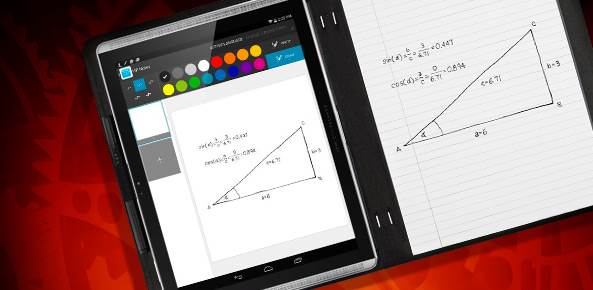Rather than reworking consumer devices for the workplace, Hewlett-Packard says it is taking a modular, purpose-built approach to developing technologies and services for mobile business. HP unveiled eight new mobile devices Tuesday, including the HP Pro Slate 12 (shown here) — as well as a whole “ecosystem of accessories” and service partners — aimed at helping enterprise users make the most of business on the go.
HP’s new devices include two Android tablets equipped with digital pen technology, a Windows tablet, a Windows convertible and a heavy-duty tablet designed for manufacturing and fieldwork. Other technologies making their debut include a tablet designed especially for the healthcare market, Windows and Android tablets for the education market and a point-of-sale device for the retail market.
“Mobile devices are changing how we live and work, and they also pose significant challenges to IT departments who have to support their now-mobile workforces while keeping corporate data managed and secure,” said Ron Coughlin, senior vice president and general manager of Personal Systems for HP. He added that, when combined with new solutions from HP’s software partners, the new devices provide a way for businesses to “securely harness the promise of mobility.”
‘A Choice of Experiences’
According to HP, the new line of mobile devices is designed to support multiple operating systems to give business users “a choice of application ecosystems and user experiences.”
The new Android HP Pro Slate 8 and HP Pro Slate 12 tablets, for example, offer HD displays, a body thickness of less than 8 millimeters (0.31 inch) and “business-day battery life.” Powered by a Qualcomm Snapdragon 800 series processor, both tablets come with the HP Duet Pen digital pen technology, which works on both the tablet and on paper. The eight-inch HP Pro Slate 8 is also “one of the first tablets to market using Corning Gorilla Glass 4, Corning’s toughest cover glass to date.”
HP’s new Windows devices include the HP Elite x2 1011 G1, an 11.6-inch two-in-one device that comes with a WiGig enterprise wireless dock and lightweight travel keyboard. According to HP, the convertible has been “tested to military specs for durability.” Users can also find the Windows operating system on the new HP Pro Tablet 408 G1.
Another device designed for durability, the HP ElitePad 1000 G2 Rugged Tablet, offers an IP 65 rating for water and dust and is designed for mobile use in manufacturing and in-field environments. The table provides up to 20 hours of battery life and features a 2D barcode reader.
Designed specifically for the healthcare market, the HP ElitePad 1000 G2 Healthcare Tablet is treated with anti-microbials. It also offers a 2D barcode reader to enable users to validate personnel, patients and medications.
HP also unveiled its latest offerings for the retail market — the HP Retail Case for ElitePad, which provides support for mobile and fixed point-of-sale services — and for the education market, including the Windows-powered HP Pro Tablet 10 EE, HP Services for Schools, the HP School Pak of learning tools and IT resources and HP Classroom Manager software for teachers.
Special Challenges for IT
We reached out to Kate Pearce, director of Mobility Research and senior wireless consultant for the analyst firm Compass Intelligence, to learn more about current trends in enterprise mobility.
She told us education, retail and healthcare are three of the leading industries making the most of mobile devices.
In addition to needing to deliver the “basics” — such as access to corporate e-mail and other communications platforms — businesses today “see more need for mobile access everywhere they go. Security is also top of mind, especially as the consumerization of IT continues with bring your own device.”
The BYOD trend poses special challenges for IT managers “from a security and tailoring perspective,” Pearce noted, adding, “This is where containers and other solutions that the carriers and OEMs are working on, to separate work and play on the device.”
John:
Posted: 2015-01-20 @ 2:23pm PT
I’ve seen some increase in tablet use. But to be honest, much of what I have seen has been Apple iPads which were being used in inventory control, and shipping documents. For a tablet to work, you have to have the right apps.





![[Interview] [Galaxy Unpacked 2026] Maggie Kang on Making](https://loginby.com/itnews/wp-content/uploads/2026/02/Interview-Galaxy-Unpacked-2026-Maggie-Kang-on-Making-100x75.jpg)